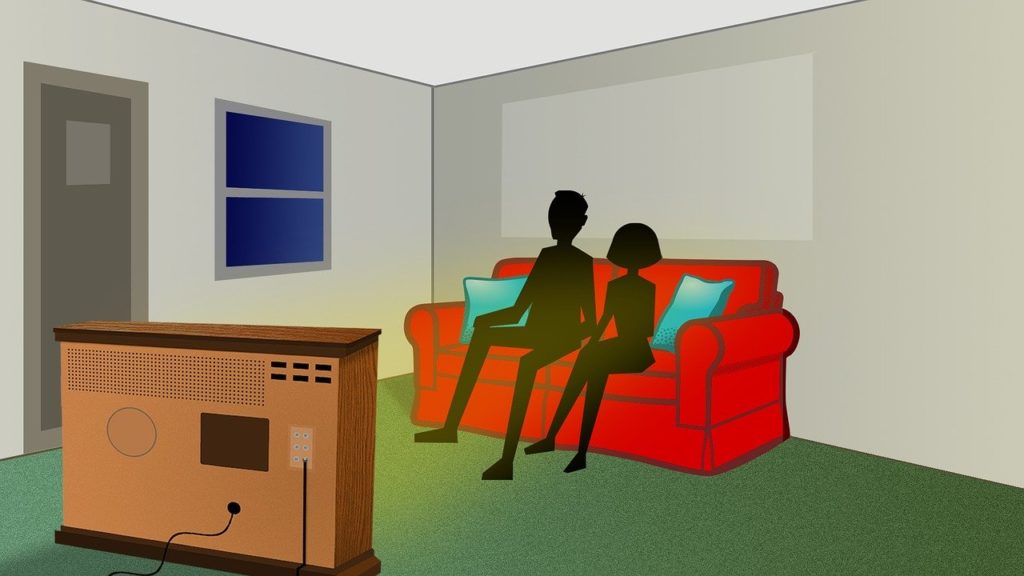Qasim Choudhary, Student, Jamia Ahmadiyya Canada

Those who are still safe from Covid-19 now face a dilemma of their own – boredom.
As week 5 of the quarantine approaches, our screen-time is, understandably, on an upwards trajectory.
Perhaps you have exhausted the entire collection of Netflix, Amazon Prime and Disney+ and are hard-pressed in search of a new pastime. But before exploring alternative hobbies, let’s break down our binge-watching for the past 30 days and what it means for our health.
Let’s look at a typical schedule for the average person:
- 8 hours of sleep
- 5 hours of (movies/television)
- 3 hours (cellphone/videogames)
- 8 hours for other activities (cooking, eating, cleaning, exercise, schoolwork, etc.)
A schedule like the one above means watching 93 movies (the average movie being 96.5 minutes) or 225 television episodes (assuming each episode was 40 minutes long) over the past 30 days.
How does this schedule translate in terms of our health? Those who exhaust long hours snugly seated before their screens are most susceptible to obesity (Thorp AA, Owen N, Neuhaus M, Dunstan DW. Sedentary behaviors and subsequent health outcomes in adults a systematic review of longitudinal studies, 1996-2011. Am J Prev Med). What’s more is that people spending more than four hours a day glued to screens face a staggering 49% greater risk of heart attack or stroke than those who viewed fewer than two hours of television a day. (www.health.harvard.edu/heart-health/the-trouble-with-watching-too-much-tv)
With fitness and recreational centres shutting their doors, the waistbands of the masses are in serious danger of opening.
Steve Gortmaker, a professor of the practice of health sociology in the Harvard TH Chan School of Public Health, says:
“Most people think, ‘Well, you spend a lot of time sitting around, so you gain weight.’ But most of the impact is just because of the marketing and advertising during that time that tends to increase the intake of a range of unhealthy food products.”
Alongside sedentary and unconscious behaviors are the tempting whispers from the kitchen; no cinematic experience is truly complete without munching down on artery-clogging foods and sipping on drinks causing tooth decay.

Falling victim to the evil whispers of sugary snacks is a phenomenon experienced by all that is devastating to our health. (Miller SA, Taveras EM, Rifas-Shiman SL, Gillman MW. Association between television viewing and poor diet quality in young children. Int J Pediatr Obes. 2008; 3:168-76)
Then comes the issue of long nights and irregular sleep patterns; inadequate sleep is another contributing factor to obesity (Strasburger VC. Children, adolescents, obesity, and the media. Pediatrics. 2011; 128:201-8). Studies have shown that sleep-deprived young men have higher cravings for foods rich in fat and carbohydrates than those who are well rested, owing to hormonal changes caused by the lack of sleep. (Spiegel K, Tasali E, Penev P, Van Cauter E Brief communication: Sleep curtailment in healthy young men is associated with decreased leptin levels, elevated ghrelin levels, and increased hunger and appetite. Ann Intern Med. 2004; 141:846-50)
Growing bellies aside, the content our eyes and brains are consuming possesses dangers of its own to our spiritual well-being. When encouraging children to finish all their vegetables, the intention is to promote healthy nutrition for a healthy body. A healthy mind is just as vital, but this is, oddly, often overlooked. While the junk our bodies consume is regulated, why is the junk our eyes consume ignored? Isn’t it time that a “media diet” is implemented in our households?
Children today are being exposed to more graphic, violent and sexualised material earlier and more readily than ever before. Unfortunately, the popular media and Hollywood are the main culprits of this barrage of ill-timed and sensationalised images and notions.
Research has shown that children exposed to sexual content are more likely to engage in casual sex at a younger age. Cinema has normalised sexual experimentation, thus empowering youth to “explore” their sexual desires. No wonder Huzooraa categorically states that viewing such immoral programmes “destroy morality”.
Alongside the promiscuous content is the presence and demand of “virtual violence”. It comes as no surprise that first-person shooting games, such as Call Of Duty, reign supreme in popularity, with sales topping $600 million in a matter of three days following its release. (www.forbes.com/sites/paultassi/2019/10/30/call-of-duty-modern-warfare-sales-top-600-million-in-three-days/#2bddae707956)
Multiple studies have shown that children exposed to violence are more likely to be aggressive and may also develop behavioral problems. They can also become desensitised to violence, which may be the worst outcome. (McCarthy, 5 August 2019, Protecting children from the dangers of “virtual violence”, Harvard Health Publishing)
But perhaps the most severe consequence of late nights and adopting a mindless sofa-spud lifestyle is missing prayers.
Hazrat Khalifatul Masih V, may Allah be his helper, outlines how excessive use of TV causes one to neglect worship. He says:
“Evils of these days include television and the Internet. You can observe this in most homes that the eldest to the youngest are not offering Fajr Salat on time as they are either watching TV or are online on the Internet until late, watching some programme and, as a result, they cannot wake up on time. Such people do not even realise that they have to get up for Salat in the morning. Both the Internet and TV and similar useless things not only cause you to miss your Salat once or twice but those who fall victim to this behavior get into this habit of watching programmes until late at night or sitting on the Internet. Then it becomes challenging to get up for the prayer in the morning, and [such people] may not even wake up [at a reasonable time]. Some people eventually fail to give any importance to Salat.” (Friday Sermon, 20 May 2016)
With such apparent adverse effects on ones physical and spiritual health, how can one curb the unhealthy binge-watching habit back into a healthier and more meaningful lifestyle?

Consider the following: Hazrat Amirul Momineenaa advises us to spend this time of quarantine productively by reading various books and publications of the Jamaat (amongst other things). (Special Message, 27 March 2020)
Take, for example, the book Noah’s Ark, written by the Promised Messiah, Hazrat Mirza Ghulam Ahmadas. The English translation of this book contains approximately 38,225 words. The average reading speed is 300 words per minute, which means it would take around 1.5 hours to complete this book.
In other words, it takes less time to finish this one book of the Promised Messiahas than it takes to finish a Harry Potter movie.
Aside from the intellectual stimulation provided by the Promised Messiah’sas literary works, the blessings associated with studying and pondering over his divinely-inspired literature is unmatched.
Hazrat Musleh-e-Maudra, commenting on the benefit enveloped in reading the books of the Promised Messiahas, states:
“Therefore, read the Holy Quran and, to understand it, remember the books of the Promised Messiahas. These books are such an incredible national weapon in your hand that Satan runs away, even at the mere sight of them.” (Al Fazl, 22 January 1920)
For the sake of ourselves and our children, let us put down the remote control and flatten our TV curve, lest Satan flattens our spiritual curve. Take this opportunity to grow upwards, not outwards. Take this time to, as our beloved Imamaa has said, “Purify your hearts.” (Friday Sermon, 10 April 2020)

